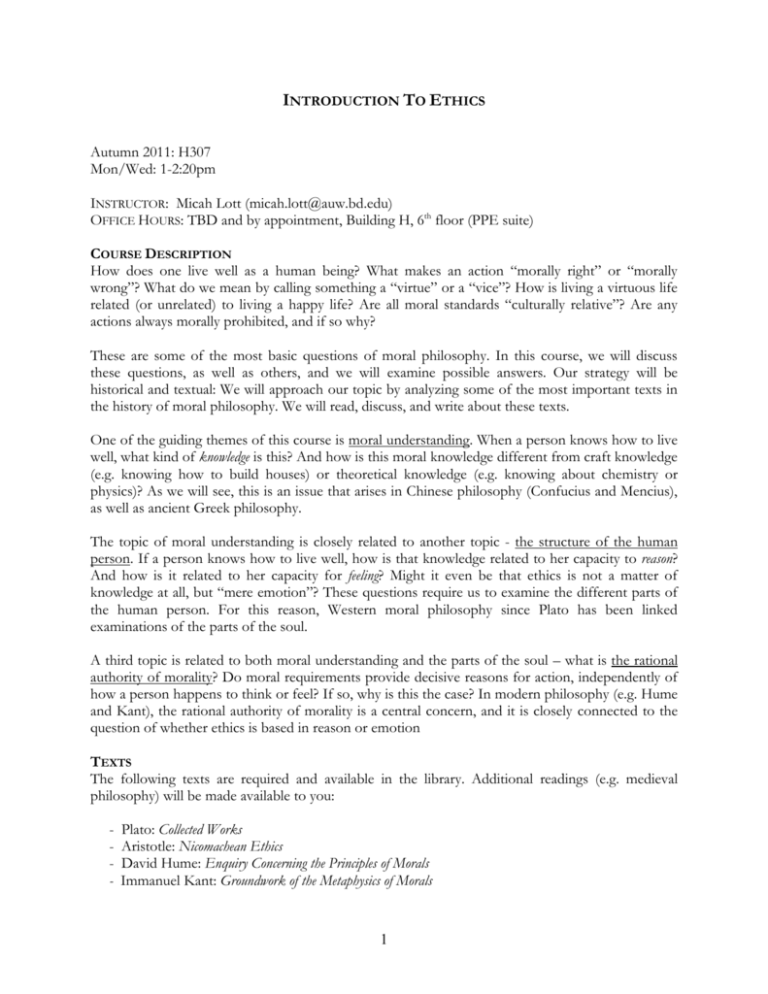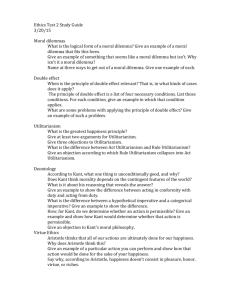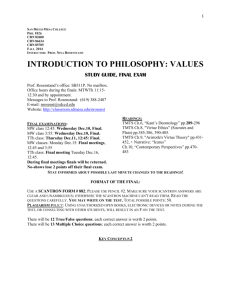Introduction To Ethics
advertisement

INTRODUCTION TO ETHICS Autumn 2011: H307 Mon/Wed: 1-2:20pm INSTRUCTOR: Micah Lott (micah.lott@auw.bd.edu) OFFICE HOURS: TBD and by appointment, Building H, 6th floor (PPE suite) COURSE DESCRIPTION How does one live well as a human being? What makes an action “morally right” or “morally wrong”? What do we mean by calling something a “virtue” or a “vice”? How is living a virtuous life related (or unrelated) to living a happy life? Are all moral standards “culturally relative”? Are any actions always morally prohibited, and if so why? These are some of the most basic questions of moral philosophy. In this course, we will discuss these questions, as well as others, and we will examine possible answers. Our strategy will be historical and textual: We will approach our topic by analyzing some of the most important texts in the history of moral philosophy. We will read, discuss, and write about these texts. One of the guiding themes of this course is moral understanding. When a person knows how to live well, what kind of knowledge is this? And how is this moral knowledge different from craft knowledge (e.g. knowing how to build houses) or theoretical knowledge (e.g. knowing about chemistry or physics)? As we will see, this is an issue that arises in Chinese philosophy (Confucius and Mencius), as well as ancient Greek philosophy. The topic of moral understanding is closely related to another topic - the structure of the human person. If a person knows how to live well, how is that knowledge related to her capacity to reason? And how is it related to her capacity for feeling? Might it even be that ethics is not a matter of knowledge at all, but “mere emotion”? These questions require us to examine the different parts of the human person. For this reason, Western moral philosophy since Plato has been linked examinations of the parts of the soul. A third topic is related to both moral understanding and the parts of the soul – what is the rational authority of morality? Do moral requirements provide decisive reasons for action, independently of how a person happens to think or feel? If so, why is this the case? In modern philosophy (e.g. Hume and Kant), the rational authority of morality is a central concern, and it is closely connected to the question of whether ethics is based in reason or emotion TEXTS The following texts are required and available in the library. Additional readings (e.g. medieval philosophy) will be made available to you: - Plato: Collected Works Aristotle: Nicomachean Ethics David Hume: Enquiry Concerning the Principles of Morals Immanuel Kant: Groundwork of the Metaphysics of Morals 1 COURSE REQUIREMENTS I) PARTICIPATION. Discussion is essential for learning philosophy, and significant amount of class time will be devoted to discussion. You should come to class having read and thought about the assigned texts, and prepared to discuss them. You should also be prepared to be called on in class. If you show yourself to be unprepared for class discussion, this will adversely impact your participation grade. You will receive credit for the quality, not the sheer quantity, of your participation. I will take attendance. You are allowed 2 unquestioned absences. After that, each absence will cost you a step in your participation grade (from A to A-, B+ to B). Absences may be excused by extreme circumstances (e.g. family tragedy – see handout). An absence will not be excused if you email me to explain that you are very busy, not feeling well, etc. In addition, at the discretion of the instructor, there may be short writing assignments that will be due in class. These will figure into your participation grade. Participation will account for 15% of your final grade. I emphasize: the participation aspect of your grade will not be a “free pass” for full credit. If you are not the sort of student who enjoys coming to class and participating, I suggest you consider taking a different course. II) ASSIGNMENTS. You will write three papers: First paper (4 pages), due Oct 17th worth 25% of your final grade. Second paper (5 pages), due Nov 23rd worth 25% of your final grade. Third paper (6 pages), due Dec 19th worth 35% of your final grade. GRADING You will receive both letter and numerical grades for each assignment. The numerical grades will be used to calculate your final grade. Numerical and letter grades correspond as follows: A 10.0-9.5 A- 9.4-9.0 B+ 8.9-8.7 B 8.6-8.3 B- 8.2-8.0 C+ 7.9-7.7 C 7.6-7.3 C- 7.2-7.0 D 6.9-6.5 F 6.4 and below Late papers will be deducted one grade step (e.g. from B to B-) for each day after the deadline they are received. You are allowed 1, no questions ask, no penalty, 2-day extension on one of the papers. I suggest you save this till absolutely necessary. No other extensions are allowed, outside of tragedy. PLAGIARISM Plagiarism is strictly forbidden. Plagiarism undermines the enterprise of learning. It is dishonest. It is disrespectful to other scholars and to your instructor. Do not plagiarize. If you are unsure of what counts as plagiarism, please ask me or the TA. It is better to ask up front than to be penalized later. For a first offense, you will receive an F on the assignment. For a second offense, you will receive an F for the course. Also, see the attached sheet stating AUW’s policy plagiarism. ELECTRONICS All electronic devices should be switched to silent mode before coming to class. Because laptops tend to be a distraction and an impediment to discussion, their use is prohibited. 2 SPECIAL CONCERNS If you have any questions or concerns – including any concerns related to a disability or special need – please feel free to speak with me or email me. I am happy to make accommodations. I want all of you to be able to learn in a safe, comfortable environment. SCHEDULE OF MEETINGS INTRODUCTION M Selections from Confucius: Basic questions of moral philosophy. 9/12 Being “learned” and knowing The practical character of our inquiry. how to live. Course organization and policies. PART I: ANCIENT ETHICS: PLATO AND ARISTOTLE W 9/14 Plato: Protagoras 309a–328d What is a sophist? Can virtue be taught? Socrates’ first remarks. Protagoras speech on virtue and human nature. M 9/19 Plato: Protagoras 323c–347c Protagoras speech cont: two kinds of human wisdom, civic life. Socrates’ first refutation of Prot. Interlude. W 9/21 Plato: Protagoras 347 –362a Final questioning: pleasure and good, reason and passion, virtue as knowledge. M 9/26 Aristotle: Nichomachean Ethics I.1–I.7 “the good is ‘the which all things seek’ ”; happiness; character of ethical inquiry; function and virtue W 9/28 Aristotle: Nichomachean Ethics I.8–I.13 Different goods and kinds of life; “happiness is some activity of soul in accordance with complete excellence” M 10/3 Aristotle: Nichomachean Ethics II.1–II.9 Intellectual and moral virtue. Pleasure, pain and habituation. Account of moral virtue. W 10/5 Aristotle: Nichomachean Ethics III.1–III.9 Voluntary and counter-voluntary. Deliberation, wish, and choice. Two moral virtues: courage and moderation. NB: Second assignment topics distributed. M Aristotle: Nichomachean Ethics 10/10 VI.1–VI.13 Distinctions among intellectual virtue. Varieties of wisdom/understanding. Unity of the virtues. W Aristotle: Nicomachean Ethics 10/12 X.6–X.9 Complete happiness and contemplation. Ethics as a subdivision of politics. 3 PART II: MEDIEVAL THEISTIC PHILOSOPHY + First assignment due in class: Monday, October 17 M Ar-Razi: Philosopher’s Way 10/17 Sec. 1-26 “let us know make as thorough a statement about the philosophical way of life as will be of benefit to those who love and honor knowledge” W Alfarabi: Attainment of Happiness 10/19 Subdivisions 1–3 “the four human things by which supreme happiness is achieved” M Avicenna: The Decicive Treatise 10/24 C.1–E.1 Defense of philosophy against the charge of unbelief. The intention of the Law and its methods: “true science is cognizance of God” W Maimonides: The Guide 10/26 Part 3.26-28, 34 The aim and purpose of the law: well-being of the soul and well-being of the body. M Aquinas: Summa Theologica 10/31 The chief end of human beings found only in the next life -happiness as the beatific vision. PART II: MODERN APPROACHES: HUME AND KANT W 11/2 David Hume: Enquiry I and II Morals founded in reason or sentiment? Account of benevolence. M 11/14 David Hume: Enquiry III and IV Account of justice and political society. NB: Second assignment topics distributed. W 11/16 David Hume: Enquiry V and VI Usefulness, agreeableness, and self-love. Social virtue and why it pleases. M 11/21 David Hume: Enquiry VII and VIII Sentiment of approbation without a view to utility. Eloquence, modesty, decency, cleanliness. W 11/23 David Hume: Enquiry IX and Appendix 1 “The notion of morals implies some sentiment common to all mankind, which recommends the same object to general approbation” + Second assignment due in class: Wednesday, November 23 M Kant: Groundwork 11/28 Preface and I Forms of rational cognition. Aim of the book: “nothing more than the search for and establishment of the supreme principle of morality” (4:392). 4 W Kant: Groundwork 11/30 Part I cont. The good will, moral esteem and duty. Initial statement of categorical imperative. M 12/5 Kant: Groundwork II 3 formulations of CI: Universal Law, Humanity, and Autonomy. NB: Final assignment topics distributed. W 12/7 Kant: Groundwork II cont. The kingdom of ends. Relations among the 3 formulations of categorical imperative. Mill’s criticism of Kant. M Kant: Religion 12/12 Part I. 1-3 Radical evil in human nature. Animality, humanity, personality. Two fundamental maxims of good and evil W Kant: Religion 12/14 Part I. 4 “The human being must make or have made himself into whatever he is or should become in a moral sense, good or evil.” + Final assignment due: Monday, December 19 5








